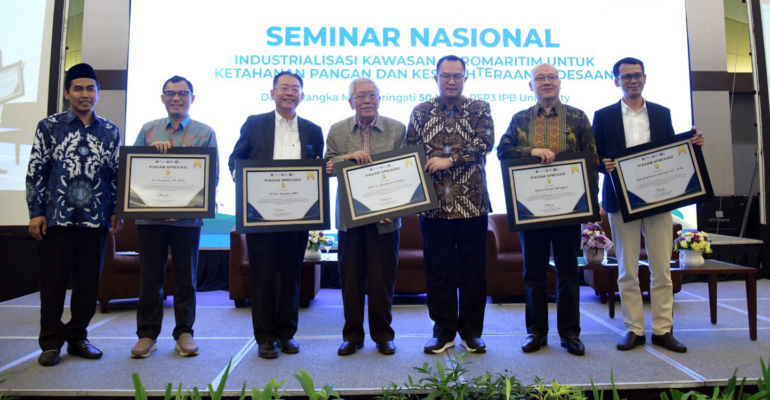Commemorating 50 Years of Establishment, PSP3 IPB University Holds Seminar on Industrialisation of Agromaritime Areas

Centre for Agricultural and Rural Development Studies (PSP3) IPB University held a Seminar on Industrialisation of Agromaritime Areas for Food Security and Rural Welfare at IPB International Convention Center (IICC), Bogor (15/8). This activity was held in commemoration of the 50th anniversary of PSP3 IPB University.
In his speech, the Chief of PSP3 IPB University, Dr Jaenal Effendi, explained that the vision of PSP3 reflects the great hope to realise the welfare of Indonesian people, especially in rural areas, through inclusive and sustainable development.
This, he said, can be achieved with an area-based development approach that utilises the potential and advantages of local resources.
“The keyword for agromaritime regional industrialisation refers to increasing the productivity and added value of local superior products in the agricultural and marine sectors. This effort is supported by the integration of land and seascapes as an archipelago, where people combine livelihoods on land and sea,” he said.
Rector of IPB University, Prof Arif Satria who was also present said that in 2030, Indonesia will experience a demographic bonus. That year, as much as 46.19 per cent of the population is in productive age.
He said, “As a university that focuses on agromaritime, IPB University plays an important role in utilising this potential to strengthen innovation-based human resources (HR), which can make Indonesia a greater country.”
“The agromaritime industry has now entered phase 4.0, which demands integration between the agromaritime sector and information technology,” he said.
Prof Arif continued that the occurrence of high economic growth must be accompanied by broad community participation and reduction of social inequality.
Therefore, the industrialisation process, especially in the real sector, needs to be encouraged to open up opportunities for people to be involved in economic activities.
“Social and economic transformation must go hand in hand. Industry in the agromaritime region only encourages economic transformation without involving the community in the industrialisation process. Industrialising means that the community is involved in becoming a learning society that takes a role for progress, this is what we must do,” he said.
On the same occasion, Professor of IPB University, Prof Rachmat Pambudy, said that industrialisation and the global food chain were not new to Indonesia.
According to him, “These two factors allowed the Dutch colonisers to stay in Indonesia for hundreds of years. As a country with the largest sea area in the world and the longest tropical coast, Indonesia has great potential that has not been fully utilised, despite the availability of development theories.”
“Food is a matter of life and death for this nation. Therefore, we must build food security. When Indonesia became independent, the main vision was to achieve self-sufficiency in rice. Our first president established IPB University because he realised the importance of human resource quality for the welfare of the nation,” he said.
In this activity also invited various speakers, namely President Director of PT CIMB Auto Finance, Ristiawan Suherman; Chief of the National Food Agency, Arief Prasetyo Adi, ST, MT; Main Director of Perum BULOG, Prof Bayu Krisnamurthi; Professor of IPB University, Prof Bungaran Saragih; Main Commissioner of Agricon Group, Harlan Bestari Bengardi; PT Agro Investama Group, Petrus Tjandra, MBA; and Founder of PT Minaqu Indonesia, Ade Wardhana Adinata. (dr/Rz) (IAAS/RUM)



